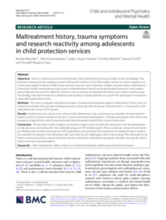Displaying 1151 - 1160 of 2503
This article focuses on the “zero-tolerance” policy adopted in spring, 2018, in the USA.
The importance of mental and behavioral health for child welfare clients is well-documented; yet, little is known about the challenges therapeutic service providers (TSPs) experience working in child welfare practice. To explore this topic, five focus groups were conducted with 40 TSPs in a contracted mental and behavioral health agency and data were analyzed following an inductive thematic process.
The International Symposium on Child Abuse is a premiere conference that provides expert training and numerous networking opportunities to professionals in the child maltreatment field.
The objective of this study was to identify factors associated with difficult parenting experiences and placement disruption.
This study has three aims: (1) to provide an overview of a module designed to support relationship building between LGBTQ+ youth in foster care and their caregivers, (2) to describe the theater testing procedure used to assess usability of the developed module with foster caregivers and adults, and (3) to share the results of the theater test.
This open access study compared self-reported impact of research participation against maltreatment history and current post-traumatic stress symptomatology among a randomly selected group of adolescents (< 18 years old) in the child protection service (CPS) system.
This article aims to identify risk and protective factors associated with families returning to the US child welfare system within a social ecological framework, to identify gaps in the current literature, and to discuss areas for future research.
To explore the viability of positive youth development for youth in care, this observational study investigated whether participation in a summer camp-based reunification program for siblings separated by foster care in the US and Australia called Camp To Belong influenced youth resilience, a critical protective mechanism for maltreated youth.
This study examined the effectiveness of solution-focused brief therapy (SFBT) on child well-being and family functioning outcomes for child welfare involved parents.
This research addresses one of the most pressing and controversial issues facing child welfare policymakers and practitioners today: the dramatic overrepresentation of Indigenous families in North American public child welfare systems. The article presents a successful model of inclusive education: the Center for Regional and Tribal Child Welfare Studies (the Center) at the University of Minnesota, Duluth, School of Social Work.

